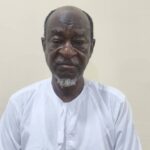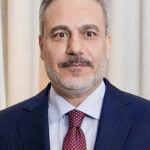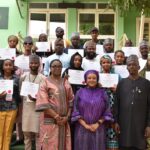By Sumaila Ogbaje
Nigeria has reiterated its strong commitment to deepening regional cooperation in the fight against terrorism and violent extremism across Africa.
Maj.-Gen. Adamu Laka, National Coordinator, National Counterterrorism Centre (NCTC), gave the assurance at the opening of a two-day Capacity Building Workshop and Preparatory Meeting for African Union (AU) Peace and Security Council (PSC) Committee of Experts.
Laka said that hosting the workshop at the NCTC underscored Nigeria’s leadership role and determination to strengthen continental security coordination under the African Union framework.
He noted that the meeting comes at a time when the continent faces evolving and interlinked threats from terrorism and violent extremism to transnational organised crime and instability requiring “innovative, coordinated, and sustainable responses.”
According to him, no country can overcome these challenges in isolation.
“Nigeria continues to advocate and invest in regional cooperation, intelligence sharing, and capacity building as cornerstones of our collective security.”
He highlighted the recent Memorandum of Understanding (MoU) signed between the NCTC and the African Union Commission to strengthen counterterrorism initiatives in West Africa and the Sahel as a milestone in regional collaboration.
“The MoU provides a practical framework for harmonised strategies, information sharing, and technical assistance in line with the AU’s Peace and Security Architecture,” he said.
Laka reaffirmed that under President Bola Tinubu, Nigeria had remained steadfast in advancing the AU’s vision of a peaceful and secure continent through sustained investment in counterterrorism coordination, regional partnerships, and community-based approaches.
In his remarks, the Chairperson, PSC Committee of Experts, Dr Jean Djeunkeng, pledged the committee’s commitment to strengthening Africa’s collective mechanisms for conflict prevention, management, and resolution.
Djeunkeng said the gathering comes at a defining moment for the continent which continues to face a period of turbulence and uncertainty.
He noted that the Committee of Experts carries a vital responsibility to enhance the council’s effectiveness and ensures it remained the ”locomotive” of the AU’s peace, security, and governance architecture.
“Our task over these two days is to reflect on how to strengthen the working methods of the Peace and Security Council so that it fully delivers on its triple mandate of prevention, management, and resolution of conflicts across Africa.
“We must assess successes, challenges, and failures and develop solutions that will make our collective action more effective and responsive,” he said.
He commended Nigeria and the NCTC for hosting the meeting, describing the facility as a symbol of African ownership and resolve in the fight against terrorism.
He also lauded the recent Memorandum of Understanding between the NCTC and the African Union Commission as a model of regional collaboration.
Djeunkeng outlined three key agenda for the experts’ retreat which include assessing its budgetary execution and planning for future activities; and ensuring that the 2026 annual work programme aligns with the council’s mandate to translate strategic objectives into concrete results on the ground.
He expressed optimism that the meeting’s outcomes would provide actionable recommendations to guide the forthcoming 17th PSC Retreat of Ministers scheduled for Nov. 6 and 7 in Abuja and contribute to broader AU peace initiatives, including the upcoming Abuja Forum on lessons learned from peace support operations in Africa.
“With unity of purpose and clarity of vision, this Committee of Experts can help shape a safer and more prosperous Africa. Let us proceed with confidence, commitment, and collective resolve,” he said.
In her remarks, the Head of PSC Secretariat, Neema Chusi, urged member states and regional institutions to strengthen coordinated, African-led responses to the continent’s complex and evolving security challenges, including terrorism, violent extremism, and organised crime.
Chusi reaffirmed the AU’s commitment to deeper collaboration with Nigeria and regional partners in promoting peace, stability, and sustainable development across Africa.
She commended the government of Nigeria and the NCTC for hosting the meeting.
“We congratulate the Centre for signing a Memorandum of Understanding with the AU, a milestone that will deepen collaboration, especially on issues related to counterterrorism,” she said.
Chusi described the meeting as timely, coming at a moment when the continent was faced with serious challenges ranging from terrorism and violent extremism to organised crime networks and governance crises that undermined stability and development.
“These challenges demand renewed collective commitment. As experts entrusted with guiding and advising the Peace and Security Council, your role is strategic. You are uniquely positioned to translate insight into action,” she added.
The two-day preparatory meeting brought together experts from AU member states, regional economic communities, and peace and security institutions to harmonise positions ahead of the main AU PSC retreat. (NAN)(www.nannews.ng)
Edited by Deborah Coker












